Metasearch engines began as a way for potential guests to compare hotel room prices across different booking sites, all in one place. Over time, they've evolved from a simple pay-per-click model into a commission-per-booking system. Today, internet giants like Google and Tripadvisor even offer instant booking, charging hotels a commission on bookings made directly through their platforms.
In this guide, we'll explore what metasearch engines are, how they work, how to connect your hotel, and how to get the most value from them.
Table of contents
What is a metasearch engine for hotels?
A metasearch engine is a comparison tool that lets travelers view hotel rates across multiple booking sites in one easy-to-use list. It pulls pricing and availability in real-time, so travelers don't have to open dozens of tabs to compare deals.
For hoteliers, these engines offer a streamlined approach to marketing and distribution. Metasearch acts as both a booking channel and an advertising platform - a valuable opportunity for capturing last-minute and direct bookings.

What does a metasearch engine do and how does it work?
A metasearch engine collects hotel prices from various booking sources, letting guests instantly compare and book the best deal. Hotels can bid for placement in the listings using a cost-per-click (CPC) or pay-per-click (PPC) model.
For travelers, metasearch provides transparency, efficiency, and control. For hotels, it offers a scalable way to increase visibility and bookings, especially when integrated with your hotel booking engine.
How does metasearch bidding work?
Bidding on metasearch is how hotels compete for visibility on results pages. You set a maximum CPC bid, and your listing enters an auction alongside OTAs and other hotels. Platforms like Google, Bing, and Tripadvisor reward high-performing listings with better placement - often at a lower cost per click.
Once a user clicks, you pay - regardless of whether they book. That's why it's vital to monitor metrics like ROAS, CPA, and CTR closely.
How to connect your hotel to a metasearch engine?
Getting started is straightforward, but different platforms use different models. The most essential engines to connect to are Google and Tripadvisor.
Google Hotel Ads uses data feeds to pull rates and availability, paired with a bidding model. To get set up, it's best to work with a third-party connectivity partner to manage the technical and campaign side.
For most other engines, a channel manager, a CRS or a PMS for revenue managers that supports metasearch integration will allow you to distribute rates, manage availability, and track performance in one place.
What are the most popular metasearch engines?
There are several big players when it comes to metasearch. We've already mentioned Google and Tripadvisor, but you may also want to consider Orbitz, Momondo, WeGo, Trivago, Skyscanner, Hotels Combined and more. Hoteliers have no choice but to be on Google and Tripadvisor, but these other, smaller engines should not be overlooked, and also serve as powerful tools to reach various segments.
Google Hotels
Google Hotels is arguably the most important metasearch engine. It works seamlessly with Google Maps and Gmail to offer personalized results to travelers. Guests can track prices and access deals directly from their inbox. To get started, create a Google Business Profile - this also ensures your property appears on Google Maps.

How to start on Google Hotels
First, verify your hotel's free business profile on Google to ensure visibility on Search and Maps. Highlight what makes your property stand out - include photos, a list of amenities, and always respond to reviews.
To display free booking links with your live rates, you'll need a connectivity partner that can send your real-time availability to Google. If you don't already have one, Google provides a form to help you connect. Once linked, your booking links will appear on your profile, and you can start running hotel ads.
These ads help you reach travelers searching for hotels in your area. You can tailor pricing based on availability and choose the bidding strategy that suits your goals - whether that's paying per booking or for traffic to your website.
Skyscanner
Skyscanner is both a metasearch engine and an online travel agency, allowing travelers to research and book a wide range of options, including hotels. It's particularly popular with millennial travelers.
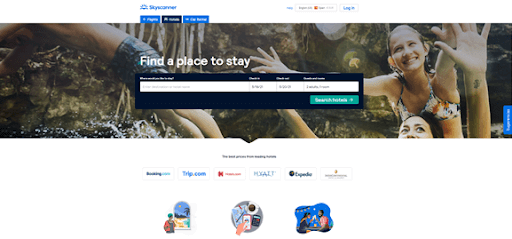
How to advertise your property on Skyscanner
Start by completing the partner inquiry form to find the right solution for your property. Skyscanner offers a range of campaign types - from brand and performance marketing to destination-focused campaigns. If you work with media planners or agencies, Skyscanner can support you in building a tailored paid media strategy.
You can target guests through mid-funnel campaigns like content and articles or drive direct bookings with lower-funnel strategies that link directly to your site.
Kayak Hotels
KAYAK, part of Booking.com, is ideal for travelers looking to bundle accommodation with flights. While hotel ad placements can be limited, partnering with an airline or offering exclusive packages can help you stand out.
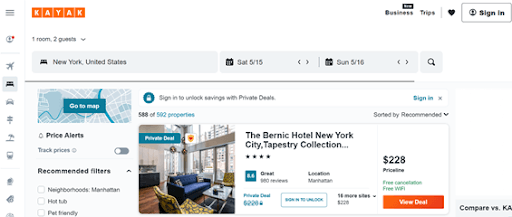
How to start with KAYAK Hotels
To get started, connect with one of KAYAK's booking engine partners to display real-time pricing and availability. If you already work with other KAYAK-affiliated platforms-such as Momondo, HotelsCombined, Checkfelix, Cheapflights, Swoodoo, or Mundi - your listings will automatically show in search results.
Advertising options include display and search ads, email and newsletter placements, content marketing, and affiliate campaigns.
Tripadvisor
Tripadvisor remains one of the most well-known and trusted travel platforms. If your hotel isn't listed here, you're likely missing out on a large segment of potential guests. The platform supports direct bookings and comparison shopping, making it essential for visibility.
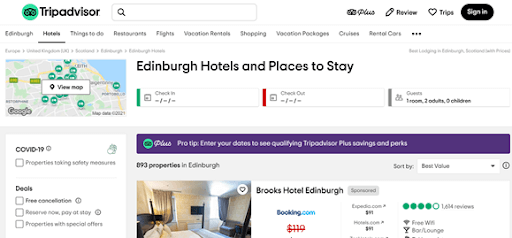
How to connect to Tripadvisor
First, claim and verify your business listing. Ensure all information is accurate and complete - add photos, amenities, accessibility details, room features, and business hours. Regularly responding to reviews helps build guest trust.
Tripadvisor offers multiple advertising tools. Sponsored placements help target travelers looking for hotels with similar features, while Business Advantage listings let you share offers, contact details, and website links to increase direct bookings. Promoting your listing can also improve its position in search results and help you outshine competitors.
Hotels Combined
HotelsCombined, part of Booking Holdings, operates in over 42 languages and offers real-time comparisons for hotels, hostels, apartments, and other lodging options.
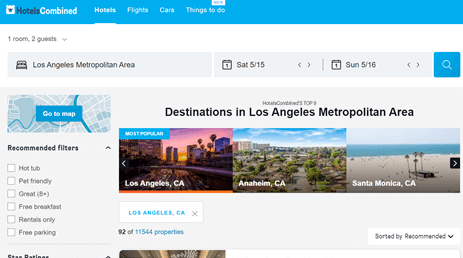
How to join Hotels combined
To list your property, email your photos, amenities, and key information to hotelier@hotelscombined.com - be sure to include your property's name and address. For advertising opportunities, reach out to adsales@kayak.com to explore campaign options.
Trivago
Trivago is a widely recognized metasearch engine, once a major player in the space before Google's dominance. It compiles prices and availability from various booking sites and charges a fee per click, creating revenue opportunities for hotels.
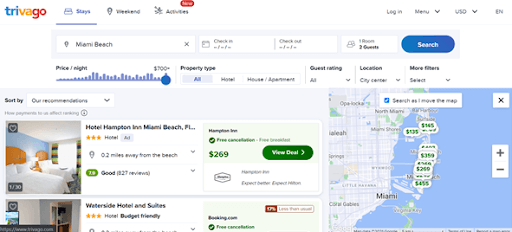
How to start a campaign in Trivago
To join Trivago, submit your application. The platform is open to hotel chains, independent properties, connectivity providers, and OTAs.
Trivago offers two models: Cost-Per-Click (CPC) and Cost-Per-Acquisition (CPA). CPC charges per user click based on your bid, while CPA charges a percentage only once a booking is made.
Orbitz
Orbitz is a metasearch platform for booking hotels, flights, cars, packages, and cruises. It's part of the Expedia Group and a great tool for increasing visibility and reaching new guest segments.

How to get started with Orbitz
Visit Orbitz and follow the steps to list your property. Verification takes just a few steps. Depending on your goals, you can choose from various campaign types - whether you're focused on brand awareness or driving conversions. Orbitz also offers display ad campaigns to showcase your property and engage travelers with targeted messaging.
Momondo
Momondo is a travel search engine that ranks results based on price, guest ratings, and popularity. Its algorithm favors competitive pricing and click-through performance. Due to its network, similar deals may appear across several affiliated platforms.

Get listed on Momondo
To appear on Momondo, connect with one of their booking engine partners to feed your live rates and availability. If you're already partnered with one, your property should automatically show up. For advertising, reach out to Momondo's ad team to explore available campaign options.
Wego
Wego is a leading online travel agency in the Middle East and North Africa, widely used for flight searches and hotel bookings. Its popularity is boosted by partnerships with smartphone companies, where the app comes pre-installed, making it a convenient choice for travelers booking hotels.

What to know to get started with Wego
To list your hotel, email hoteliers@wego.com. Requests are typically processed within 2-3 business days. Wego offers a variety of advertising options including display, email, app-based ads, and social campaigns - helping your property reach more travelers across the region.
What is the best meta search engine for your property?
The best metasearch engine for your property depends on your location and target audience. To maximize visibility, start by identifying your primary guest segments and researching which platforms are most effective in your region. It's essential to be visible where your potential guests are searching.
Many metasearch platforms also have partnerships with each other, allowing your property to appear on multiple sites through a single integration. Take advantage of these connections to boost exposure across channels.
Tips for using a hotel metasearch engine
With so many hotel metasearch engines out there, it can be difficult to know how to manage them. These tips will help you build a strategy that drives revenue and turns metasearch into one of your most powerful tools.
Show all room rates
Displaying all available room rates - not just the cheapest - creates transparency and builds trust. When guests can view all options, they're more likely to book what suits them best. This also increases your chance to upsell premium rooms or packages like suites and sea views.
Different sites require different strategies
Each platform has its own audience and pricing model. Google, for example, converts well but comes at a higher cost, so it's key to optimize campaigns continuously to get the best return.
Skyscanner is a strong option if you're targeting millennials, while Tripadvisor - though great for traffic - is typically used more for research than booking. In that case, you might opt for a lower cost-per-click (CPC) strategy to control spend while maintaining visibility.
Keep rates consistent across platforms
Before launching on any metasearch engine, benchmark competitor pricing and set your rates accordingly. Make sure your direct booking rate matches what's shown on other platforms. You can still offer value-adds on your own site - like exclusive perks or bundles - but rate parity helps avoid confusion and builds trust.
Set clear priorities
With limited time and budget, you won't be able to invest in every platform. Research where your audience is searching, and focus on the most relevant channels. Google and Tripadvisor are must-haves, but prioritize those that focus specifically on accommodation if you can only pick a few.
Your tech stack matters
Having a reliable PMS or CRS that integrates with metasearch engines is essential. The right tools make it easier to manage campaigns, keep rates updated, and access performance data that drives better decision-making.

How to improve your hotel's visibility on metasearch?
Metasearch performance varies across platforms, so it's important to evaluate your presence and adjust strategy accordingly. Here are some practical ways to optimize:
Maintain rate parity
Offer a consistent or slightly better price for direct bookings. You can also include incentives like breakfast, early check-in, or room upgrades - as long as they don't conflict with OTA agreements.
Invest in advertising
Paid placements can improve both visibility and organic performance. Since metasearch engines are often trusted by users, advertising here can build brand recognition and encourage direct bookings. Choose the bidding model - CPC or CPA - that best aligns with your goals and margins.
Optimize your website
Once guests click through to your site, make sure it's ready to convert. Clear calls to action, fast loading speeds, guest reviews, and trust signals like certifications all help. And of course, your booking engine should work smoothly on both desktop and mobile.
Test and recalibrate
No one platform will work for everyone. Run campaigns on different engines and track performance against key metrics like CPC, CTR, conversion rate, CPA, and ROAS. Double down on what works and reallocate budget from what doesn't.
Target the right target audience and adjust with demand
Use data to determine where your ideal guests are browsing, and tailor your metasearch strategy to match. Seasonality and demand also play a role - adjust campaigns accordingly to stay relevant and cost-effective.
What's the difference between metasearch engines and OTAs?
The key difference is that metasearch engines aggregate information, while OTAs sell inventory directly.
OTAs (Online Travel Agencies) let guests book via their own platforms, and typically charge high commissions (10-20%), depending on your property's size and volume.
Metasearch engines, on the other hand, display real-time rates across multiple channels and redirect users to book elsewhere - usually your own site or an OTA. They often have lower commission rates, and while some (like Google or Tripadvisor) now support direct bookings, that wasn't always the case.
In short, both play a vital role. OTAs extend your reach and simplify distribution. Metasearch gives you control over rate visibility and direct bookings. Investing in both ensures maximum visibility and revenue potential, even with commission costs.
Conclusion
As we've seen, metasearch engines are an essential part of a modern hotel's distribution strategy. From how they work to how to get listed and optimize performance, understanding these platforms can help you drive more bookings.
While there are many to choose from, Google and Tripadvisor remain the most critical players. Investing in them - both time and budget - can help you find that sweet spot between visibility, direct bookings, and revenue growth.
Download our guide How to Diversify Hotel Revenue


2026 Hospitality Industry Outlook
Download now
Table of contents
Hospitality hot takes straight to your inbox



.webp)